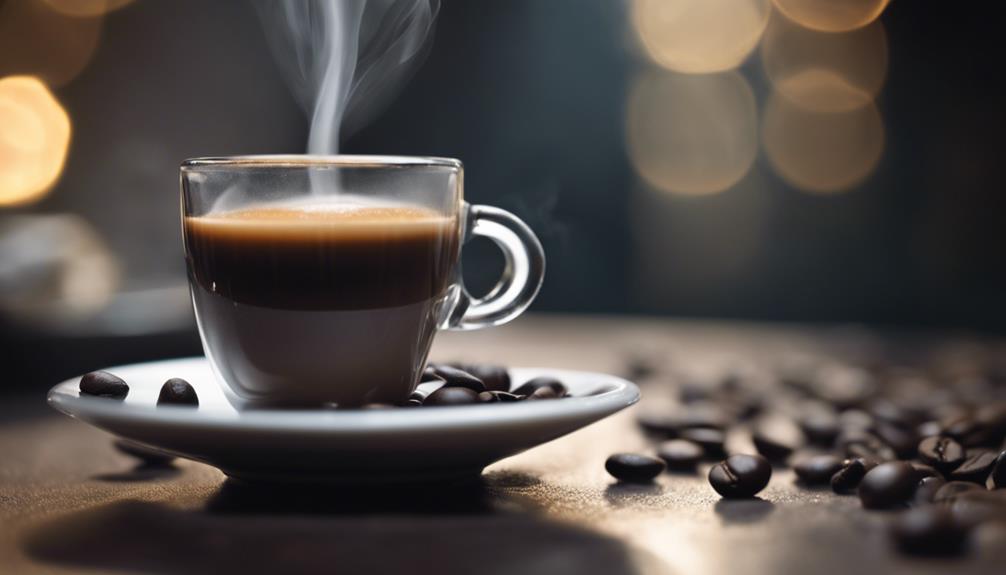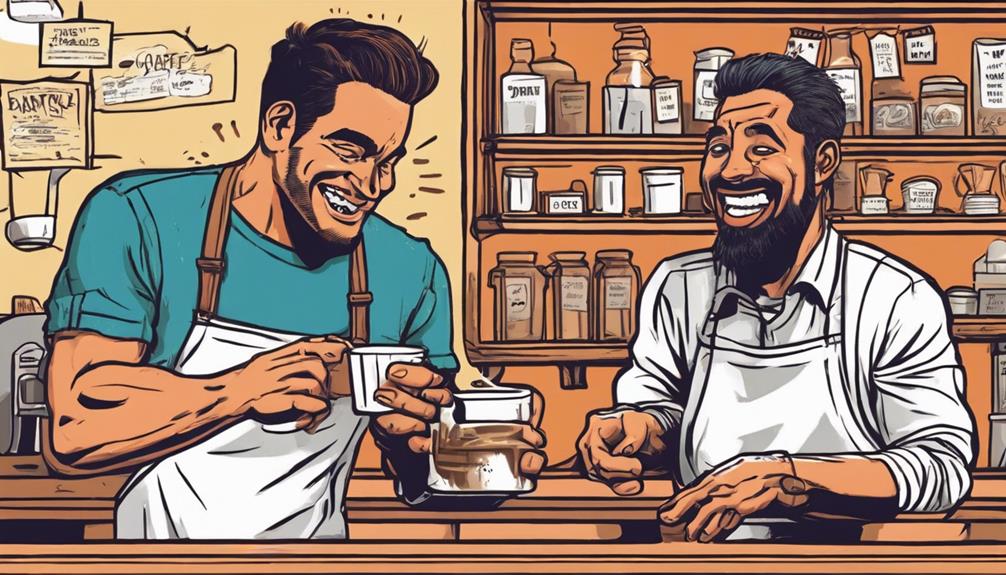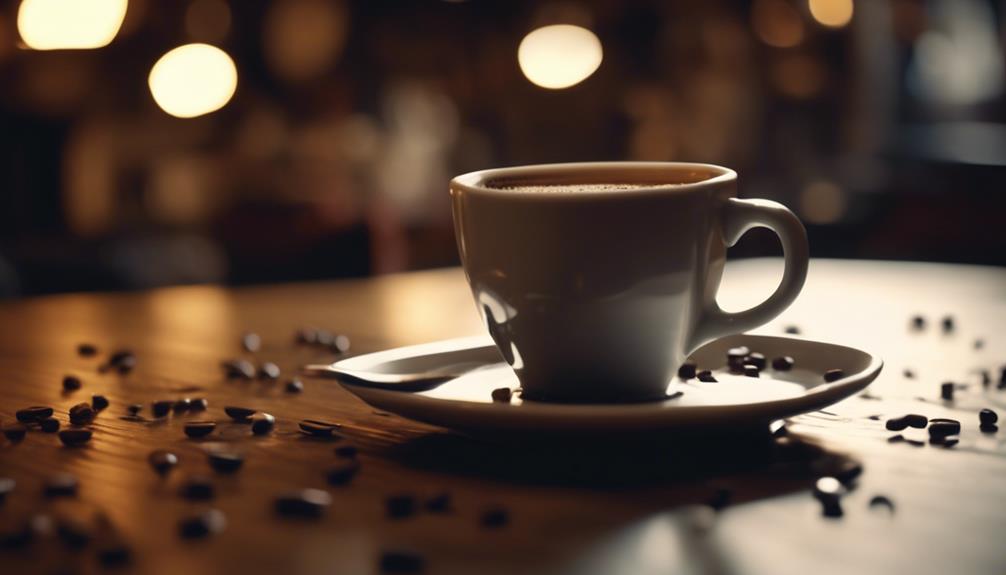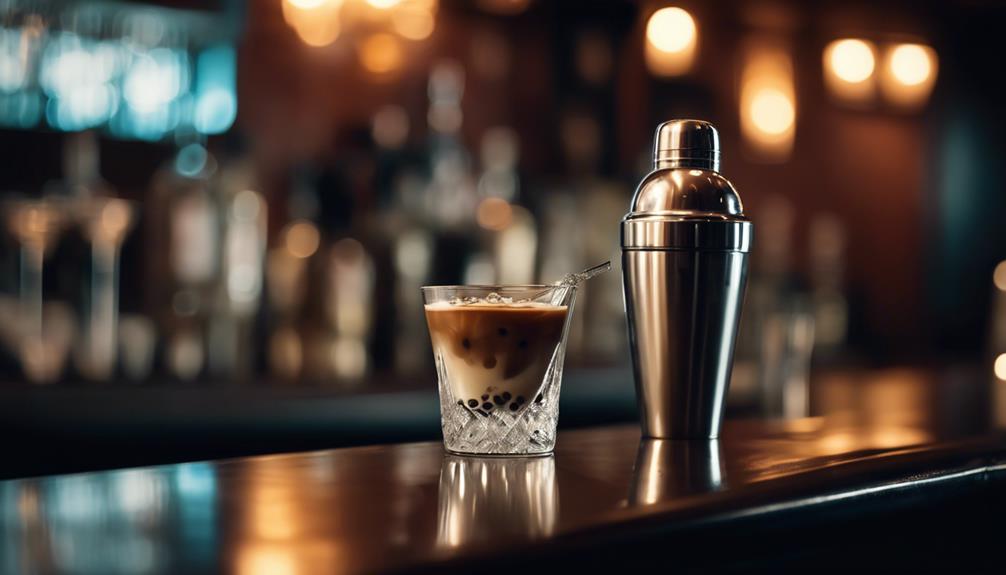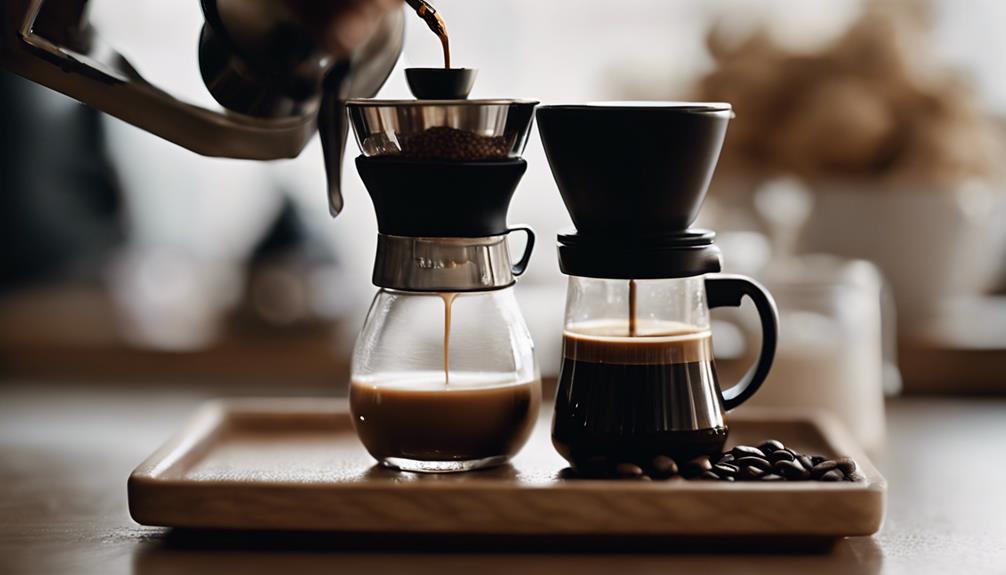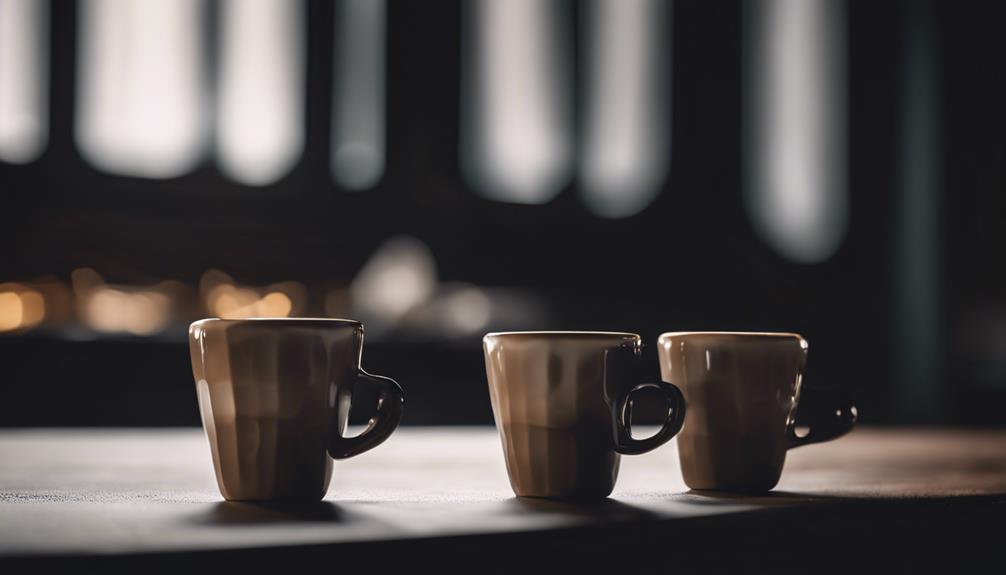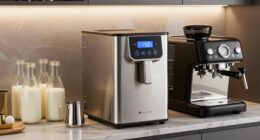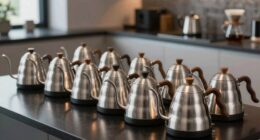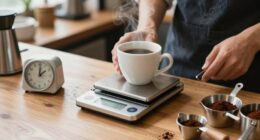Get ready for a jolt of **63 milligrams of caffeine** in your 1-ounce espresso shot, but that’s just the start. A **double shot** kicks it up to about 125 milligrams. Surprisingly, even though espresso is smaller in size, it packs a stronger caffeine punch than **brewed coffee**. An 8-ounce cup of coffee typically has more caffeine overall than a single shot of espresso. Understanding these numbers reveals the intricacies of espresso – there’s a lot more to explore about this **intense coffee experience**. Dive in to uncover the secrets of espresso’s caffeine content and why it’s a powerhouse in the coffee world!
Key Takeaways
- A standard 1-ounce shot of espresso contains approximately 63 mg of caffeine.
- A double shot of espresso, which is 2 ounces, has around 125 mg of caffeine.
- Espresso has a higher caffeine concentration than brewed coffee, with 10-12 mg per ounce.
- The type of coffee bean, roast type, and brewing method can affect the caffeine content of an espresso shot.
Caffeine Content Breakdown
When you crack open a shot of espresso, you're releasing a potent dose of caffeine into your system, with a standard 1-ounce serving packing a remarkable 63 milligrams of this stimulating substance.
The caffeine content in a shot of espresso is considerably higher than in brewed coffee, making it a potent pick-me-up. For comparison, an 8-ounce cup of brewed coffee averages around 95 milligrams of caffeine, which is roughly 12-16 milligrams per ounce.
A double shot of espresso, on the other hand, contains about 125 milligrams of caffeine, packing a bigger punch in a smaller volume. The brewing methods used in an espresso machine can affect the amount of caffeine extracted from the coffee beans, with finer grinds enhancing the concentration of caffeine.
When you consume a shot of espresso, the caffeine is quickly absorbed into your central nervous system, providing a rapid energy boost. This can lead to increased alertness and a feeling of enhanced focus. However, it’s important to be mindful of the caffeine content in espresso shots as consuming too much caffeine can lead to negative side effects such as anxiety, jitters, and disrupted sleep patterns. It’s best to consume espresso in moderation and be aware of your own tolerance to caffeine.
Understanding the caffeine content in your shot of espresso can help you appreciate the complexity of this beloved beverage. Caffeine content can vary depending on the size and strength of the espresso shot, adding to the appeal for coffee enthusiasts. When comparing espresso versus drip coffee, it’s important to note that while a typical 2 oz shot of espresso contains around 80mg of caffeine, an 8 oz cup of drip coffee may contain anywhere from 80-200mg. This difference in caffeine content reflects the nuanced flavor profiles and brewing methods that distinguish these two popular coffee options. Understanding these distinctions can deepen your appreciation for the complexity of espresso and the artistry involved in its preparation.
Factors Affecting Caffeine Levels
As you explore the world of espresso, you'll find that several factors come into play when determining the caffeine levels in your shot. Understanding these variables can help you tailor your brewing experience to your taste preferences.
The type of coffee bean you use greatly influences caffeine content, with some beans naturally containing higher levels than others. The roast type also plays a role, as lighter roasts generally retain more caffeine than darker roasts due to the roasting process.
Your brewing methods can impact caffeine levels as well. An espresso shot typically has a higher concentration of caffeine per ounce than other brewing methods like drip coffee. The grind size of your coffee also affects caffeine extraction; a finer grind increases the surface area and allows more caffeine to be released during brewing.
Additionally, the amount of coffee you use during brewing can impact caffeine levels. Using more coffee grounds can lead to a higher caffeine yield in the final beverage.
Espresso Vs. Coffee Comparison
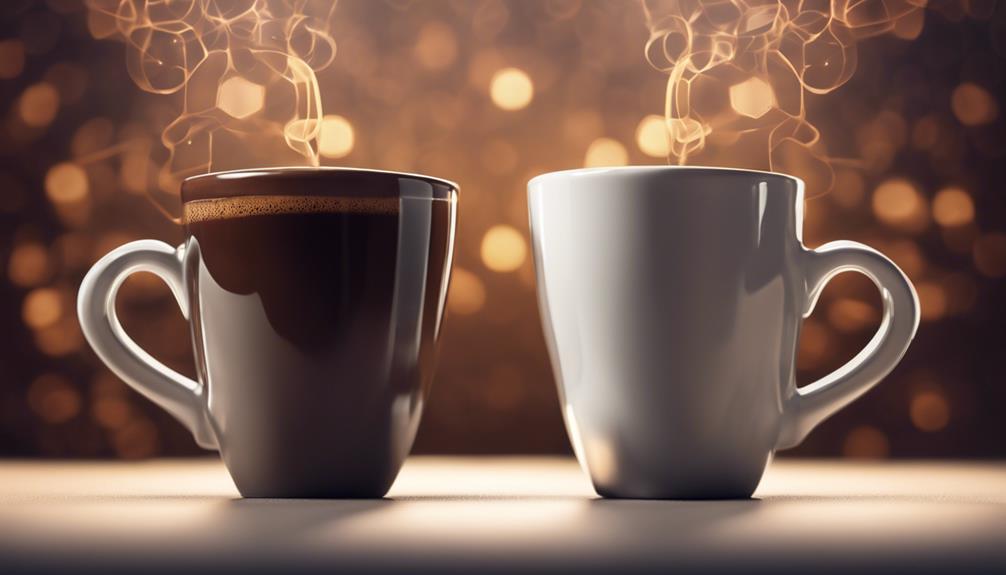
As you compare espresso and coffee, you'll notice a significant difference in their caffeine content.
You might assume that espresso, with its higher concentration of caffeine, packs a bigger punch, but surprisingly, an 8-ounce cup of brewed coffee typically contains more total caffeine than a single shot of espresso.
Now, let's explore these contrasting caffeine levels and what they mean for your daily cup.
Caffeine Content Difference
You might assume that a larger serving of coffee would provide a greater caffeine kick, but surprisingly, a standard 1-ounce shot of espresso packs a more concentrated punch than an 8-ounce cup of brewed coffee. While brewed coffee contains more total caffeine, espresso's higher caffeine concentration makes it a more potent choice.
Here are three key differences that set espresso apart:
- Caffeine concentration: Espresso has approximately 63 mg of caffeine per ounce, compared to brewed coffee's 10-12 mg per ounce.
- Faster absorption: Espresso's concentrated nature leads to quicker absorption and a more immediate effect, making it a popular choice for coffee drinkers who need a quick energy boost.
- Comparable caffeine content: A double shot of espresso (2 ounces) contains around 126 mg of caffeine, comparable to the amount found in an 8-ounce cup of brewed coffee.
As a result, espresso provides a more intense caffeine experience, even if it's in a smaller serving size. This is why many coffee enthusiasts opt for a shot of espresso over a cup of brewed coffee when they need a quick pick-me-up.
Espresso's Higher Concentration
When you compare the caffeine concentration of espresso to brewed coffee, it's clear that espresso packs a much stronger punch, with a whopping 40 mg of caffeine per ounce versus brewed coffee's 10-12 mg per ounce.
This significant difference in concentration is due to the unique brewing method of espresso, which involves rapid extraction of caffeine through fine grind size and pressurized water.
As a result, a single 1-ounce shot of espresso contains approximately 63 mg of caffeine, while an 8-ounce cup of brewed coffee holds about 96 mg.
Even a double shot of espresso, which is only 2 ounces, can have as much as 125 mg of caffeine, outdoing a typical 12-ounce cup of brewed coffee.
Although the total caffeine intake from a standard serving size of brewed coffee might be greater due to the larger volume consumed, the amount of caffeine in a single shot of espresso is undeniably more concentrated.
This concentration difference is what sets espresso apart from its brewed coffee counterpart.
Health Recommendations and Safety
As you enjoy your espresso, you're probably wondering how much is too much.
The FDA recommends you keep your daily caffeine intake under 400 mg, which is roughly two to four cups of brewed coffee.
Daily Caffeine Limit
The FDA's recommended daily caffeine limit stands at 400 milligrams for healthy adults, a benchmark equivalent to about four 8-ounce cups of brewed coffee.
As you reflect on your daily caffeine intake, remember that a single shot of espresso packs a controlled 63-75 milligrams of caffeine. This can be a great way to get your caffeine jolt while staying within the recommended limit.
However, it's crucial to evaluate your personal tolerance to caffeine. You may be more sensitive to its effects, or you may be able to handle more than the average person. Additionally, if you're pregnant or have certain health conditions, you should consult a healthcare professional to determine a safe caffeine consumption limit for you.
Here are three things to keep in mind when it comes to your daily caffeine limit:
- Moderation is key: While moderate caffeine consumption, including espresso, is associated with health benefits like improved cognitive function and reduced risk of certain diseases, excessive intake can have negative effects.
- Know your limits: Be aware of how much caffeine you're consuming and how it affects you.
- Consult a pro: If you have specific health concerns or questions, don't hesitate to consult a healthcare professional for personalized guidance.
Safe Consumption Guidelines
You should prioritize safe consumption guidelines to guarantee your caffeine intake stays within recommended health limits.
As a healthy adult, your daily caffeine limit is 400 mg, equivalent to about four 8-ounce cups of brewed coffee. Since one shot of espresso contains approximately 63 mg of caffeine, it's a controlled choice for those monitoring their intake.
Consuming two to four 8-ounce cups of brewed coffee is considered safe, translating to a caffeine intake of 192-512 mg. Moderate caffeine consumption can enhance cognitive function and physical performance, making it a great way to boost your daily productivity.
However, it's crucial to be aware of your personal caffeine tolerance, as reactions to caffeine can vary considerably from person to person.
When consuming coffee, including shots of espresso, keep track of your caffeine intake to avoid exceeding the recommended limit. By doing so, you'll guarantee you're reaping the benefits of caffeine while maintaining a healthy balance.
Equipment and Brewing Essentials
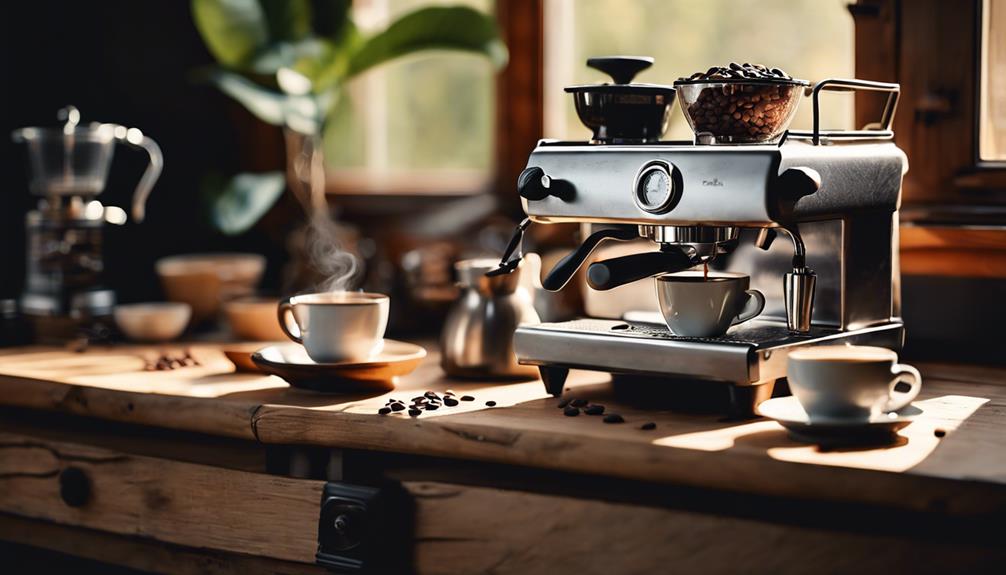
Your quest for the perfect espresso shot begins with the right equipment, specifically designed to precision-brew a concentrated shot of caffeine.
You'll need an espresso machine that can maintain consistent water pressure, ideally around 9 bars, to guarantee a well-pulled shot with a rich crema on top.
Here are the essential brewing elements to focus on:
- Fine grind size: Similar to table salt, this guarantees maximum extraction of caffeine during the brewing process.
- Optimal water temperature: Between 190°F to 205°F for the perfect balance of flavor and caffeine concentration.
- Precise extraction time: Aim for 25-30 seconds to get the best out of your coffee grounds.
Investing in quality equipment can elevate your espresso experience.
Look for machines that can deliver consistent results, and don't be afraid to explore different models based on performance and reliability.
Caffeine in Espresso Drinks Explained
From lattes to Americanos, understanding the caffeine content in your favorite espresso drinks is essential for a perfectly energized pick-me-up. When it comes to caffeine in espresso, a shot of espresso can pack a punch. A single shot typically contains about 63 mg of caffeine, while a double shot contains approximately 126 mg. However, at Starbucks, a single shot has around 75 mg of caffeine, and a double shot has 150 mg.
Here's a breakdown of the caffeine content in popular espresso drinks:
| Drink | Caffeine Content |
|---|---|
| Cappuccinos/Lattes (Short/Tall) | 75 mg |
| Cappuccinos/Lattes (Grande/Venti) | 150 mg |
| Mocha (Short/Tall) | 90 mg |
| Americano (Short) | 75 mg |
Keep in mind that serving sizes and the number of espresso shots used can affect the total caffeine content. As you navigate the world of espresso drinks, knowing the caffeine content can help you make informed choices and avoid an overwhelming buzz.
Consumption Dynamics and Variations
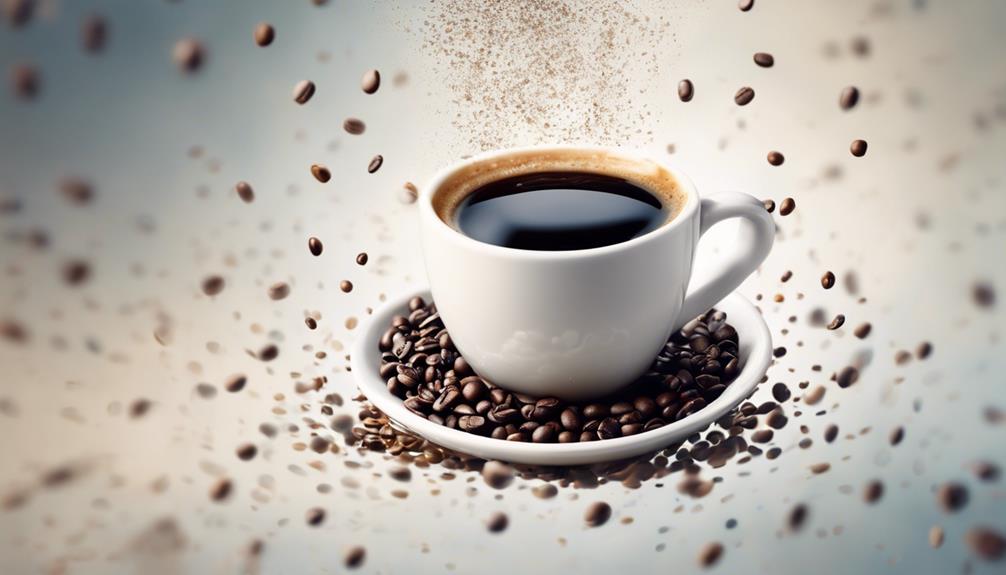
As you explore the world of espresso, it's important to reflect on how the way you consume it affects the caffeine's impact on your body. The rapid consumption of espresso, typically in small shots, leads to a swift caffeine absorption effect. This is in contrast to brewed coffee, which is usually sipped over a longer period, resulting in a more gradual intake of caffeine.
Here are three key factors to take into account when it comes to espresso consumption dynamics:
- Shot size matters: A standard 1-ounce shot contains approximately 63 mg of caffeine, while a double shot has about 125 mg.
- Rapid consumption intensifies effects: Drinking espresso quickly can lead to a more intense experience compared to sipping brewed coffee over time.
- Variations in caffeine content: Espresso drinks can vary greatly in caffeine content based on the number of shots used, from 75 mg for a single-shot cappuccino to 150 mg for a double-shot.
Understanding these factors can help you tailor your espresso consumption to your individual needs and preferences, ensuring you get the perfect boost without overwhelming your system.
Frequently Asked Questions
Is 2 Shots of Espresso a Lot of Caffeine?
You're wondering if two shots of espresso are a lot of caffeine? Well, with around 126 mg, it's a significant amount, but still within the daily limit.
How Much Caffeine Is in a Single Shot of Espresso?
As you savor the rich flavor, you're likely curious: how much caffeine is in a single shot of espresso? On average, you're getting around 63 mg of caffeine per 1-ounce serving, a concentrated kick to start your day.
What Is Considered 1 Shot of Espresso?
You're wondering what constitutes a single shot of espresso. Generally, it's considered 1 ounce of brewed coffee, but some shops, like Starbucks, define it as 0.75 ounces. Either way, it's a concentrated dose of coffee goodness!
Which Espresso Shot Has the Most Caffeine?
You know that an average 8-ounce cup of brewed coffee has 95-128 mg of caffeine? Now, when it comes to espresso shots, a double shot at Starbucks has the most caffeine, packing a whopping 150 mg per serving.
Conclusion
As you wrap up your espresso-fueled journey, the numbers start to blur, but the truth remains: every shot is a gamble.
Will you hit the sweet spot of 60-70mg or fall prey to a caffeine bomb? The variables swirl like steam rising from your cup, waiting to be controlled.
Master the brewing arts, and the perfect balance is within reach.
But for now, the next shot looms, a mystery waiting to be solved.
Will you take the risk, or play it safe? The caffeine countdown begins…
